Politics
‘Terror-free Türkiye key to deepening Turkic world integration’
A Türkiye cleansed of terrorism will become a strategic threshold for greater economic, cultural and political unity across the Turkic world, the ruling Justice and Development Party (AK Party) Deputy Chair Kürşad Zorlu said Monday.
Speaking at the “Turkic World Relevant Institutions and Organizations Consultation Meeting” in Ankara, Zorlu, who also heads the party’s relations with Turkic states, said this vision aligns with President Recep Tayyip Erdoğan’s “Century of Türkiye” foreign policy goals.
“One of the most important pillars of the Century of Türkiye is building an institutional and multifaceted structure in relations with the Turkic world,” Zorlu said. “We are making a new beginning that will accelerate the Century of Turkic World.”
The meeting brought together 15 public institutions directly tied to the Turkic world, covering sectors from education and culture to diaspora affairs. Zorlu said the aim was to strengthen coordination, pool resources and unite around common projects.
Türkiye has been a driving force in the Organization of Turkic States (OTS), with Zorlu noting the bloc’s growing influence beyond its regional borders. The combined gross domestic product (GDP) of member states reached $2.1 trillion in 2024 and is expected to surpass $3 trillion by 2030, potentially making the OTS the eighth-largest economic bloc globally.
Trade among Turkic states has surged sixfold over the past two decades, while their share of global trade has risen by 70%, hitting 2.42% in 2024. Türkiye’s trade with its Turkic partners has grown fourteenfold since 2002, reaching $26 billion, with total intra-Turkic trade standing at $70.3 billion.
Investment ties are also strengthening. In 2002, there were virtually no companies with Turkic state capital in Türkiye; by March 2025, that number had risen to 5,405.
Zorlu said ongoing OTS initiatives, including efforts to enable identity and travel integration across member states, would further bind the region together.
“As Türkiye, we are determined to lead this process and move forward shoulder to shoulder with our sister states,” he said.
For Ankara, deepening ties with the Turkic world is not only an economic opportunity but also a geopolitical strategy to reinforce stability at home and project influence abroad, a role Zorlu argued will only grow once Türkiye fully eliminates terrorism.
Under the “terror-free Türkiye” initiative launched last year, the PKK terrorist group announced its dissolution in May. It began disarming last July, ending four decades of violence that claimed more than 40,000 lives in Türkiye, as well as in Iraq and Syria.
Politics
Erdoğan marks 11 years in power as first publicly elected president
A constitutional amendment that ended the largely ceremonial role of the president boosted President Recep Tayyip Erdoğan’s place in the annals of Turkish democracy. The charismatic leader whose party has won successive elections since 2002 marks 11 years in power on Sunday, as the first president directly voted into office by the nation.
During Erdoğan’s tenure as democratically elected president, Türkiye has weathered several crises and raised its diplomatic profile as a significant power broker and a force to reckon with, from mediating crises between Ethiopia and Somalia to the conflict between Russia and Ukraine and giving a powerful voice to Türkiye against Israel’s attacks on Gaza. At home, Erdoğan mobilized the nation and steered the recovery after the “disaster of the century” or earthquakes that killed tens of thousands of people in southern Türkiye in February 2023. Most recently, the People’s Alliance under the leadership of Erdoğan embarked upon an ambitious plan to disarm the PKK and end decades of violence by the terrorist group.
It was a rough path for Erdoğan, who himself and his party faced numerous challenges over the past two decades, but ultimately, the public’s will for true democracy won. Erdoğan had to wait seven years for the first direct presidential election, following a 2007 amendment that changed the election rules and was approved by a public referendum. Before the amendment, the presidency was a ceremonial role and Parliament elected the president. Opposition parties initially opposed the arrangement, but when the election date neared, they fielded their own candidates one after another. Erdoğan, the candidate of his Justice and Development Party (AK Party), was challenged by former Organisation of Islamic Cooperation (OIC) Secretary-General Ekmeleddin Ihsanoğlu, who was supported by the majority of opposition parties, and Selahattin Demirtaş, co-chair of the now-defunct Peoples’ Democratic Party (HDP).
Erdoğan secured more than 51.7% of the vote, becoming the 12th and first directly elected president of the Republic of Türkiye. Three years later, he won another victory for further changes to the presidential system, when more than 51% of the voters approved the executive presidency system, granting more powers to the president in a 2017 referendum. In 2018, another presidential vote was held, this time pitting Erdoğan against more challengers, but the veteran politician managed to beat his rivals again. His last election was in 2023 and Erdoğan etched his name in the annals of Turkish democracy again by defeating Kemal Kılıçdaroğlu, the joint candidate of a six-party opposition bloc, although this time in a runoff vote.
In a social media post on Sunday, AK Party’s deputy chair, Efkan Ala, marked the day and said the era of running Türkiye “without public consent” was “over.” “The irade is now idare,” he said, using Turkish words for “will” and “administration” respectively.
The presidency in its original form was a powerful authority, as evidenced during the tenure of Mustafa Kemal Atatürk, the country’s first president and founder of the Republic of Türkiye. His successor, Ismet Inönü, was branded as “National Chief” for his immense power that even continued when his Republican People’s Party (CHP) was in opposition. But after the 1960 coup that ousted President Celal Bayar from power, it became a mere symbol of “authority” without any real power, while the post of prime minister evolved into the actual seat of governance. The post only had its influence when former army chief Kenan Evren launched a coup in 1980 and installed himself as president. Before and after that coup, prime ministers and presidents rarely aligned, and this separation was most evident during the tenure of Ahmet Necdet Sezer, who infamously clashed with then-Prime Minister Bülent Ecevit in 2001 during a National Security Council meeting, paving the way for an economic crisis.
Ala said Erdoğan’s election was a turning point in Turkish history, marking a revolution that eliminated the shadow of “tutelage.” He was referring to the influence of a political and military elite that had threatened with a coup and occasionally succeeded in launching it in the past, whenever they felt their interests were threatened.
“This reform led by the AK Party strengthened national sovereignty, reinforced democratic representation and put the nation’s approval at the heart of politics. Decisions, authority and responsibility now are being shaped directly by the will of they people,” Ala said.
“National will is the strongest foundation. This step ensured that Türkiye continues its path stronger and decisively. We turned the page on the crisis stemming from the presidential elections,” he said.
Politics
Armenia eyes Türkiye deal after historic peace talks with Azerbaijan
Armenia and Azerbaijan’s move for a permanent peace raises hope for a normalization between Türkiye and Armenia.
Armenia’s deputy foreign minister described an “historic” trilateral summit with Azerbaijan and the U.S. at the White House as a turning point in Armenia-Azerbaijan normalization while creating an “important milestone” for same with Türkiye.
Vahan Kostanyan told Anadolu Agency (AA) on Saturday that the meetings marked “an important milestone,” one day after Armenian Prime Minister Nikol Pashinyan, Azerbaijani President Ilham Aliyev and U.S. President Donald Trump signed an agreement at the White House to end decades of conflict.
“Yesterday’s discussions, both bilaterally with the United States and trilaterally with the United States and Azerbaijan, were very important, even historic,” said Kostanyan. “We registered an important milestone when it comes to Armenia-Azerbaijan normalization, but also strengthening of the Armenia-U.S. sttrategic partnership.
He noted three key memoranda of understanding were signed between Armenia and the U.S., on capacity building for Armenia’s Crossroads of Peace project, cooperation in artificial intelligence and semiconductors, and on energy.
On the Armenia-Azerbaijan agreement, he highlighted that the peace treaty agreed in March had now been initialed. They also signed a letter on the dissolution of the OSCE Minsk Group, and the joint declaration witnessed by Trump.
Kostanyan praised previous statements by President Recep Tayyip Erdoğan that encouraged Armenia and Azerbaijan to conclude a peace treaty, saying they had “positively” affected normalization talks.
“With yesterday’s event, we see an important milestone and opportunity that we can achieve with Türkiye as well,” he said. “This connectivity project can be feasible and can be much more regionally and globally important if we call communications between Armenia and Turkey are relaunched as well.”
He expressed hope that Ankara would “reciprocate the goodwill of the government of Armenia” by opening the Turkish-Armenian border and establishing diplomatic relations.
“We can achieve another very important milestone for the stability and economic prosperity in our region, meaning that we’ll be able to open the border between Armenia and Türkiye and establish diplomatic relations,” he added.
After the collapse of the Soviet Union, Türkiye was among the first countries to recognize Armenia’s independence on Sept. 21, 1991, but closed its border and severed diplomatic ties in 1993 following Armenia’s occupation of Karabakh. Relations began to thaw after the 2020 Karabakh war, with both sides appointing special envoys to pursue normalization talks.
Türkiye on Friday welcomed progress toward establishing lasting peace between Azerbaijan and Armenia, following a declaration recorded in Washington on Aug. 8.
In a statement, the Foreign Ministry said the step comes at a time of intensifying global conflicts and crises, describing it as a highly significant development for ensuring regional peace and stability.
Ankara expressed appreciation for the contribution of the U.S. administration to the process and said a “historic opportunity” has emerged for achieving peace and prosperity in the South Caucasus.
“As Türkiye, we will continue to contribute to efforts aimed at seizing this opportunity and will support the devoted efforts of our dear Azerbaijan,” the ministry said.
The two countries share a complex history. Armenia for a long time accused Türkiye or rather, the Ottoman Empire, of committing genocide against Armenian population in the country during World War I. Türkiye has repeatedly denied the claims of genocide although it acknowledged high number of deaths among Armenians due to isolated incidents and diseases.
The Second Karabakh War, which ended in 2020, reignited hopes for renewed dialogue. In 2021, Ankara and Yerevan appointed special representatives tasked with normalizing relations and negotiating the reopening of their land border. So far, limited agreements have allowed third-country citizens and diplomats to cross, but a full reopening remains elusive.
Despite these hurdles, there have been tentative gestures toward cooperation. The Margara border crossing has been used twice in recent years for humanitarian purposes: in February 2023 to deliver Armenian aid trucks following a devastating earthquake in southeastern Türkiye, and in March 2024 for humanitarian aid shipments to Syria via Türkiye. Armenia has also upgraded the crossing in anticipation of future use.
In June, Pashinyan visited Türkiye and met President Recep Tayyip Erdoğan in a historic but somewhat muted visit. Two leaders expressed readiness for peace in their region and commitment to normalization of ties.
One of the key components of Friday’s agreement at the White House summit is the development of what is being called the Trump Route for International Peace and Prosperity (TRIPP), which will connect mainland Azerbaijan and its Nakhchivan Autonomous Republic exclave.
Kostanyan said the declaration envisions opening regional transportation and communication routes under the sovereignty, jurisdiction and territorial integrity of the states they traverse.
He explained that the project will be developed by Armenia and the U.S. on Armenian territory, enabling regional communications, including a link from southern Armenia through Nakhchivan to other parts of the country.
While the founding principles have been agreed, Kostanyan said technical and working-level discussions on the project’s modalities will follow.
Politics
Türkiye considers introducing family mediator system for divorces
Justice Minister Yılmaz Tunç told reporters on Sunday that they were weighing a family mediator system applied in other countries for the peaceful settlement of divorces.
Türkiye declared 2025 as “Family Year” in a bid to strengthen family bonds and promoting marriages to prevent a shrink due to its aging population. But divorces pose a challenge for the country as figures show that a slight but significant rise in divorces for 2024 compared to 2023. The number of divorces were 187,343 last year, according to official figures. Although divorces are amicable in most cases, some divorce proceedings drag due to disputes between spouses.
Speaking to journalists on the sidelines of an event in northern Türkiye’s Bartın, Tunç said they were preparing a new “judicial package” or an omnibus bill and were seeking input from experts to put the final touches before presenting it to Parliament for approval. Tunç said divorce cases should be separated from cases related to compensation and alimony and should be concluded faster. “When you have two separate lawsuits, one involving divorce and other about sharing of jointly owned properties and alimony, divorce proceedings tend to drag. Sometimes, they take 10 years and this prevents people from building new lives,” Tunç said.
The minister noted that they discussed it with experts, including judges of family courts and officials of higher courts. “We want to end the problems our citizens face in divorce proceedings,” he said.
Tunç said seeing a family mediator can be instrumental in helping the couples before the divorce cases. “This is applied in most European countries and Türkiye can implement a similar practice,” he said
“In some instances, lawyers encourage their plaintiffs to air severe complaints against their (soon-to-be-ex) spouses and this complicates a simple lawsuit filed due to less severe disputes between the sides. When faced those accusations, spouses believe they are at a point of no return. This also affects privacy of the couples before the court and hurts children,” he said.
“We believe that family mediation will help. It can help couples to settle on terms of divorce and will shorten the time of lawsuits. Moreover, it will help them to act more calmly even if they fail to come to terms with each other during the mediation period,” he added.
Politics
Turkish NGOs rally for humanitarian corridor into Gaza
Thousands of people gathered in the capital Ankara on Sunday for a major rally calling for a humanitarian corridor into the Palestinian enclave Gaza suffering under Israel’s genocidal attacks.
The rally, organized by the Ankara Palestine Solidarity Platform, a coalition of various nongovernmental organizations (NGOs), began after afternoon prayers at Kocatepe Mosque and concluded with a march to Parliament. Protesters carried banners reading “You cannot remain silent while children are dying” and “Humanitarian corridor to Gaza, now!” They voiced slogans against Israel.
Speaking on behalf of protesters, Ismail Mansur Özdemir said the ongoing blockade of Gaza had a horrible humanitarian toll. He said that a humanitarian intervention was necessary, though many people would likely continue to suffer from debilitating diseases and injuries. “We are seeing significant efforts around the world for opening a humanitarian aid corridor. As NGOs, we support noble efforts to break the Israeli blockade through convoys and vessels,” he said, referring to recent trips to Gaza by aid flotillas that were cut short by Israel’s intervention. Özdemir said that Türkiye, with its historic and moral responsibility, always sided with the oppressed in terms of humanitarian aid. “Establishing a humanitarian aid corridor into Gaza is a necessity, but Parliament should turn it into action. As NGOs, we appeal to Parliament to lead the creation of a humanitarian aid corridor by land, sea and air. All political parties should have a common will to that extent,” he said.
On Saturday, a similar rally to show support for Palestinians was held in Istanbul. Pro-Palestinian marches are commonplace in Türkiye, which strongly supports the Palestinian cause and Hamas’ resistance.
A U.N. official on Sunday warned the Security Council that Israel’s plans to control Gaza City risked “another calamity” with far-reaching consequences, as Israeli Prime Minister Benjamin Netanyahu insisted his goal was not to occupy the territory. The United Nations Security Council held a rare emergency weekend meeting after Israel said its military would “take control” of Gaza City in a plan approved by Netanyahu’s security cabinet that sparked a wave of global criticism. “If these plans are implemented, they will likely trigger another calamity in Gaza, reverberating across the region and causing further forced displacement, killings and destruction,” U.N. Assistant Secretary General Miroslav Jenca told the Security Council.
The U.N.’s humanitarian office, OCHA, said 98 children had died from acute malnutrition since the start of the conflict in October 2023, with 37 of those deaths since July, according to Gaza’s authorities.
“This is no longer a looming hunger crisis – this is starvation, pure and simple,” said OCHA’s coordination director Ramesh Rajasingham.
Palestine’s U.N. Ambassador Riyad Mansour said Sunday, “over 2 million victims are enduring unbearable agony,” calling Israel’s plans for Gaza City “illegal and immoral,” and urged foreign journalists to be allowed into Gaza.
Netanyahu announced on Sunday a plan to allow more foreign journalists to report inside Gaza, but accompanied by the Israeli military.
Britain, a close ally of Israel which nonetheless pushed for an emergency meeting on the crisis, warned the Israeli plan risked prolonging the conflict.
“It will only deepen the suffering of Palestinian civilians in Gaza. This is not a path to resolution. It is a path to more bloodshed,” said British deputy ambassador to the U.N. James Kariuki.
World Health Organization (WHO) chief Tedros Adhanom Ghebreyesus echoed that sentiment, calling the Israeli plan “deeply worrying, given the already dire humanitarian and health situation across the Strip.”
But Netanyahu said Sunday his country was “talking in terms of a fairly short timetable because we want to bring the war to an end,” as he insisted Israel did not want to occupy Gaza.
Outside the meeting at U.N. headquarters in New York, a small but noisy protest calling for an end to the conflict was met by a large police presence.
Algeria’s Ambassador Amar Bendjama called for sanctions on Israel in response to its Gaza City plan.
“The hour has come to impose sanctions on the enemy of humanity,” he said.
“If it were another country, you would have been imposing sanctions a long time ago,” the Palestinian envoy Mansour said.
Politics
‘Shady election’ trial overshadows Turkish opposition CHP’s annual congress
Türkiye’s main opposition Republican People’s Party (CHP) is entering its annual congress season under a cloud of scandal as a looming court case over alleged vote buying in last year’s leadership race continues to dominate the party’s agenda.
The district congress delegate elections are set to begin on Aug. 13, followed by district congresses between Sept. 13 and Oct. 5, and provincial congresses from Oct. 11 to Nov. 5. Yet, instead of focusing on the upcoming elections, party insiders say all eyes are on the Sept. 15 hearing in the so-called shady congress case.
The high-stakes trial targets 12 suspects, including Istanbul’s ousted Mayor Ekrem Imamoğlu, on charges of rigging the CHP’s 38th Ordinary Congress in November 2023.
Prosecutors accuse current chairperson Özgür Özel of “buying” delegate support to oust longtime leader Kemal Kılıçdaroğlu, with alleged bribes ranging from cash and houses to coveted municipal jobs. If the court annuls the congress, Özel’s leadership could be voided and a court-appointed trustee would take over Türkiye’s oldest political party until a new vote is held.
Sabah newspaper, citing party sources, wrote that the leadership’s decision to push ahead with the congress calendar before the hearing has sparked anger among the opposition wing, who view it as an attempt to cement control ahead of a possible annulment.
“In the past, congress season was exciting and competitive,” said a former CHP official. “Now, there’s no enthusiasm. Everyone is focused on the court case, and many believe the 2023 congress will be canceled.”
Some within the party fear the trial could even pave the way for Kılıçdaroğlu’s return, deepening divisions at a time when the CHP is already accused of corruption and backroom dealings. Should the court rule against the leadership, it would deal a major blow to the party’s credibility, particularly after last year’s local election gains.
Suppose the Sept. 15 hearing does not produce a damaging ruling. In that case, however, the provincial congresses in October are expected to see fierce power struggles, with tense confrontations between Özel’s camp and their emboldened opposition faction.
Until then, the CHP’s annual congress calendar remains overshadowed by a corruption trial that has cast doubt over the legitimacy of its current leadership and reignited old rivalries within Türkiye’s main opposition.
Politics
Greece’s closure of Western Thrace schools ‘assimilation plan’
The head of the Friendship, Equality, Peace (DEB) Party, Çiğdem Asafoğlu, on Monday, has accused Athens of systematically dismantling Turkish minority education in Western Thrace, warning that the closure of three more schools is part of a wider assimilation strategy in violation of international law.
Speaking to Anadolu Agency (AA), Asafoğlu stated that the Greek Education Ministry has pursued a policy for years of reducing class sizes or shutting down schools attended by the Turkish minority. This year, just before the start of the academic term, authorities closed schools in Kardere and Mehrikos in Rhodope, as well as in Hasanlar village in the Evros region.
She stressed that student numbers are deliberately reduced each year under the pretext of “low enrollment,” resulting in a decline from 210 minority primary schools two decades ago to just 83 today. “This is a demographic engineering project targeting cultural and identity assimilation,” she said, adding that such actions are “a crime under international law.”
Under the 1923 Lausanne Treaty, Turkish minority schools in Western Thrace are meant to have autonomous status. However, Asafoğlu said Athens applies the treaty selectively. “When it suits them, they invoke Lausanne against us. When we say ‘We are Turks’ and speak of the Turkish minority, they accuse us of violating Lausanne and being a national threat. But they breach the treaty whenever it benefits them,” she noted.
She argued that even if student numbers fall, minority schools cannot be shut down under Lausanne. Yet, once closed, schools never reopen despite official claims to the contrary. “In Musaköy and Hacı Mustafa villages, the student count later met the threshold, but the schools remained shut,” she said.
Asafoğlu accused Greece of depriving children of the right to mother-tongue education and encouraging them to attend Greek schools instead, offering transportation as an incentive. “That’s not a solution; it’s assimilation,” she said.
The DEB leader also rejected Greece’s claim that closures are temporary. “We know from experience this is permanent. It’s a calculated attempt to erode our cultural and linguistic heritage,” she said.
Beyond education, Asafoğlu warned that discriminatory policies extend to economics, agriculture and personal rights. “Greece is known as the cradle of democracy, yet when it comes to the Turkish minority in Western Thrace, democracy is absent. Laws are passed without consulting the minority’s legitimate representatives,” she said.
She vowed to continue challenging the closures through political and legal channels, including the European Parliament, where DEB holds representation. “We will not allow the Turkish people here to be assimilated or ignored. These rights are rooted in history and guaranteed under international agreements,” she said.
Asafoğlu also criticized the poor physical conditions of minority schools and the state’s refusal to improve facilities. “They want conditions to deteriorate so parents send children to Greek schools. This is part of a broader effort to reduce our numbers and change the region’s demographic makeup,” she concluded.
Some 150,000 Muslim Turks in Western Thrace, economically one of the poorest in Greece, have long complained about deteriorating conditions. Seeing the community as a “hostage” of its ties with Türkiye, the Greek government has committed numerous breaches of its treaty obligations and European Court of Human Rights (ECtHR) rulings over the years, including the closure of schools, the banning of Turkish-language education and refusing to legally allow the community to elect their religious leaders like muftis (Muslim clerics), which is also another treaty right.
-
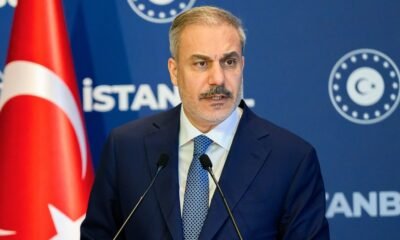
 Politics2 days ago
Politics2 days agoTurkish FM Fidan to visit Egypt to discuss Israel’s Gaza plan
-
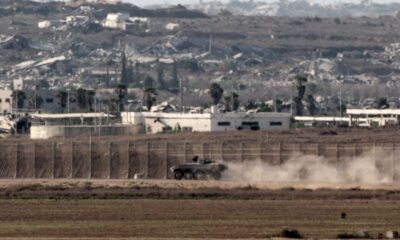
 Politics3 days ago
Politics3 days agoTürkiye urges int’l pressure to stop Israel’s Gaza plan
-
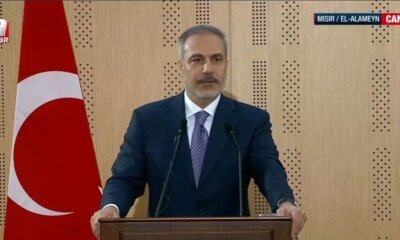
 Daily Agenda2 days ago
Daily Agenda2 days agoForeign Minister Fidan: Israel persistently sabotes cease -fire initiatives
-
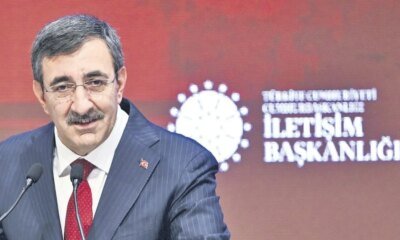
 Daily Agenda2 days ago
Daily Agenda2 days agoVice President Yılmaz: To create a chaos environment for their purpose
-
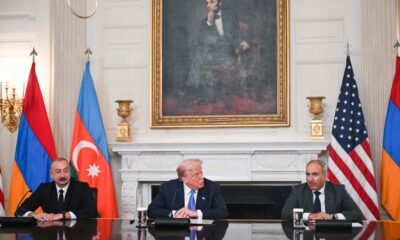
 Politics3 days ago
Politics3 days agoArmenia, Azerbaijan agree to groundbreaking peace agreement
-
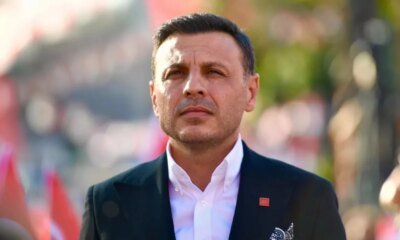
 Daily Agenda2 days ago
Daily Agenda2 days agoLawyer Mehmet Yıldırım and CHP Provincial Chairman Özgür Çelik Came Out
-
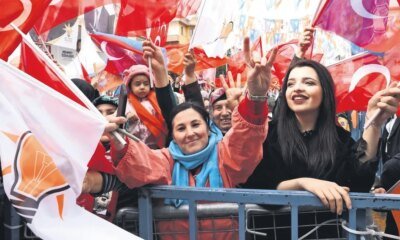
 Daily Agenda3 days ago
Daily Agenda3 days ago2 in Istanbul, 4 points in front of the CHP in front of Türkiye
-
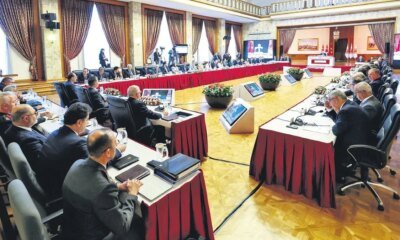
 Daily Agenda2 days ago
Daily Agenda2 days agoThe commission is a history step first buttoned the first button




